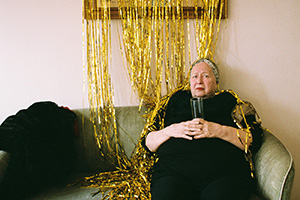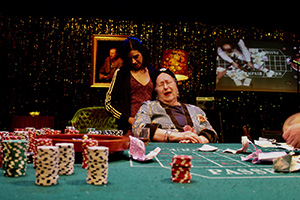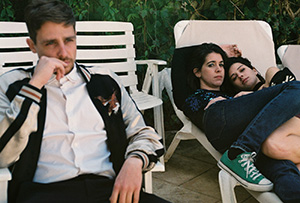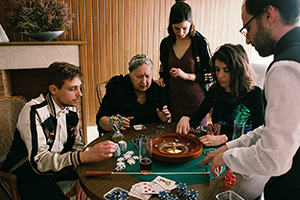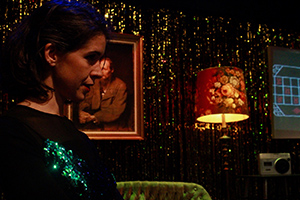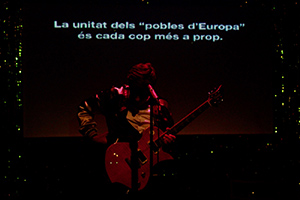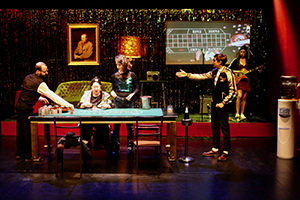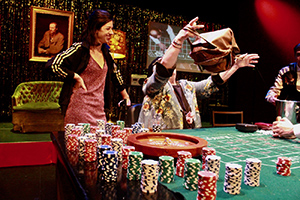Synopsis
Aleksandra did not come here to gamble. Aleksandra is part of the entourage accompanying the Russian president on his European tour, which is currently stuck in a spa town on the border between Belgium and Germany. Welcome to Rulettenburg, a spa that at night turns into a casino where Europeans of all nationalities go to make pacts with the devil. She spins the roulette wheel. Aleksandra is in love with Polina and has nowhere to go. Aleksandra wants Polina to love her, if necessary by showering her with gold coins. She spins and spins the wheel. Aleksandra must suffer to be happy. Aleksandra has to bet everything and lose everything in order to feel lucky. The roulette wheel slows down, and stops. Zero.
"Why do you bet, Aleksandra, if you don't have a penny and you hate gambling?"
"We Russians understand you; but you Europeans are too limited to understand us: I gamble to explore the dimension of the abyss... I gamble to love life."
The Project
After the death of his first wife, Fyodor Dostoyevsky began a journey through Western Europe in 1863. He was trying to follow in the footsteps of Polina Súslova, a young Russian woman with whom he had a particularly complex amorous relationship. At the end of August, Dostoyevsky decided to spend a few days in the German spa town of Wiesbaden. There, so as not to get bored, he played a few rounds at the roulette table in the famous casino. In the space of a few minutes, those coins turned into more than ten thousand francs. It was during that summer morning that the writer set out on the path towards gambling addiction, an addiction that would remain with him for several years. In his passionate dedication to gambling, what the author enjoyed was not so much the desire to accumulate as the pleasure that risk provoked in him, the emotion of going all in (whether to do with money or love).
Three years after that trip, Dostoyevsky decided to write about his experiences in a small novel. He did not do it only as a kind of therapy, to atone for his ghosts perhaps and expiate certain feelings of guilt and baseness. He also decided to write The Gambler in a record time of twenty-six days to sell the rights to his new text to the editor and be able to pay the monetary debts he had accumulated at the roulette wheel. Money… Always the money.
In The Gambler, Dostoyevsky strongly opposes the idea of a 'cultured' Europe, putting into the protagonist's mouth numerous xenophobic comments reinforcing the idea that the elites of old Europe act solely out of calculation, cynicism and greed while hiding these detestable qualities behind the apparent elegance of their manners and a cold, imposing courtesy.
This is why the fascinating text by the Russian author, conceived in an almost feverish state, becomes - in the light of current events - a warning about the precarious situation in which the European project finds itself. The ideals of a Europe which is united by a shared cultural heritage and transversal values based on humanism have disappeared, giving way to purely economic structures that have turned the European project into a mere mercantile agreement between the elites (and not even a primarily political one, but rather overridingly economic). Again, it's about money... always about money.
Continuing with the intention, as with previous productions, of recovering great literary or theatrical texts that may give us new clues as to how to better understand the turning point at which we find ourselves, here in the Ignífuga Theatre Company we aimed to make Dostoyevsky's text our own. Without betraying his underlying message, we hope we have turned it into a show with broad appeal, suitable for all types of audiences.
Credits
THE GAMBLER
A (very) free version of Dostoyevsky's novel
A show by Companyia Ignífuga
Direction: Pau Masaló
Dramaturgy: Albert Pijuan
Performers: Eduard Autonell, Marina Congost, Júlia Rodón
With the collaboration of Saskia Giró
Duration: 70 minutes
Language: Catalan
The Gambler premiered as part of El Cicló (a season featuring independent theatre companies in Barcelona) at the Teatre Tantarantana on 5th April, 2017

In 2017 The Gambler received recognition from the Dóna'm escena collective: for having created "interesting and complex female characters which reject stereotypes" and also for "demonstrating that classic texts can be adapted from a gender-based perspective."
Reviews
With a contemporary and decadent mise-en-scène (full of tracksuits and sequins), dedicated and effective performers, and that trademark cynical humour, The Player is a modern, risky and brilliant production. Don't miss it!
Gema Moraleda - Teatre Barcelona
We can start to see some of the distinguishing features of the group that are also turning out to be its best qualities: a groundbreaking aesthetic, dynamic staging and an attempt to visually and emotionally transmit all the intellectuality of the story.
Ivan F. Mula - Teatre Barcelona
The Ignífuga theatre company is comprised of young talents that has been giving us creations of commendable sensitivity for some years now. Although they claim that their aim is not that of staging intellectual theatre, the truth is that the themes they deal with and the authors they turn to make their shows an intravenous injection of pure philosophy; pure heroin with no additives. This time they dare to take on a heavyweight of Russian literature, the nihilist Fyodor Dostoyevsky and his novel The Player; adapting it very freely admittedly, but distilling its essential extract, like refined scenic perfumers who have already proven themselves. As always, the director Pau Masaló's exemplary taste permeates the whole piece.
Meritxell Rodríguez - Butxaca
